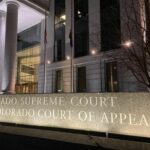Douglas County judge let prosecutors present misleading evidence of sex assault, appeals court rules
A Douglas County judge allowed prosecutors to mislead the jury into thinking they should still convict a man of sexual assault despite the absence of his DNA, Colorado’s second-highest court ruled on Thursday in overturning the convictions of Clayton Angus Hood.
Jurors found Hood guilty of raping a teenage girl who lived in his household. They heard at trial that Hood’s DNA was not found on or inside the alleged victim’s genitalia. But the prosecution minimized that fact, suggesting the victim could have shed or showered off Hood’s DNA, still rendering him guilty.
However, jurors did not know then-District Court Judge Patricia Herron blocked them from hearing how DNA from three people, including one male, was instead found on the outside of the victim’s genitalia. Writing for a three-judge panel of the Court of Appeals, Judge Jaclyn Casey Brown explained Herron’s decision meant jurors were left to believe the absence of any DNA was not a barrier to convicting Hood.
“That impression was false,” Brown wrote in the March 14 opinion. “The presence of the other DNA undermined the prosecution’s theory that Hood’s DNA was not present because (the victim) showered or expelled it naturally.”
On the night of the alleged assault, Hood went out drinking with the victim’s father. When he returned to their Castle Rock home, the victim, identified as K.H., later testified Hood entered her bedroom and had sex with her for an hour while she cried. K.H. then showered, went to school and disclosed she had been raped.
K.H.’s father picked her up from school and they went to the police station. There, the father made a call to Hood in which he confronted Hood about the alleged rape. He added there was “a camera in her room,” which was not true.
“If that’s what she said happened, then it happened,” Hood responded. When police went to the house afterward, they found Hood had unsuccessfully attempted suicide and they resuscitated him.
The prosecution charged Hood with two sex assault-related counts. Jurors convicted him and he is serving eight years to life in prison.
Prior to trial, the prosecution attempted to exclude evidence of the DNA found on the outside of K.H.’s genitals, which did not belong to Hood. The defense countered the DNA was important: If the government’s theory was that K.H.’s shower helped “gid rid” of Hood’s DNA from the rape, the presence of others’ DNA made it less likely her alleged rapist’s DNA would be gone altogether.

DNA testing
Herron acknowledged the DNA evidence addressed Hood’s potential innocence. But then she decided Colorado’s “rape shield” law, which generally shields a victim’s sexual history from being explored at trial, similarly prevented the jury from hearing about the DNA evidence.
“I am directing that you not leave the impression that there was another source” of DNA, Herron told the defense.
Prosecutors Nathaniel Marsh and Zoe Laird ended up arguing to the jury that it should not worry about the absence of Hood’s DNA from K.H. because “every woman’s body will handle DNA differently.”
On appeal, Hood maintained jurors should have heard the whole story.
“While his DNA was absent from the swab of K.H.’s external genitalia, three other DNA profiles were found. Presenting that evidence was not an invasion of (K.H.’s) privacy. It was the truth,” wrote public defender Casey Mark Klekas. “The State doesn’t have a right to mislead the jury so it can get a conviction.”
The Court of Appeals panel agreed with him. Brown observed Herron’s primary justification for excluding the DNA evidence — the rape shield law — was wrong. That K.H. had DNA on her from three other sources did not necessarily mean someone else had sex with her. The point, Brown wrote, was that the absence of Hood’s DNA was not as meaningless as prosecutors suggested to the jury.
“That someone else’s DNA was still present on K.H.’s body undermined the prosecution’s theory that the only reason Hood’s DNA was not detected there was because K.H. showered or her body otherwise naturally expelled it,” she explained.
The excluded information likely affected the outcome, the panel concluded, because there was virtually no physical evidence linking Hood to the alleged assault.
The Court of Appeals ordered a new trial for Hood.
Days before the appellate panel’s decision, news broke that a former Colorado Bureau of Investigation DNA scientist, Yvonne “Missy” Woods, tampered with DNA results and called into question the evidence in more than 1,000 criminal convictions. Although a bureau analyst testified at Hood’s trial, it was unclear if the witness was Woods or if she had any connection to the case.
The 18th Judicial District Attorney’s Office did not immediately know about any effect Woods’ misconduct had on Hood’s prosecution.
The case is People v. Hood.












